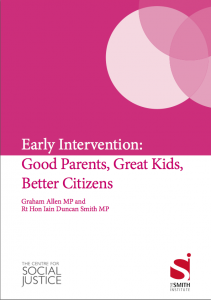 The more I learn about our broken society, the more heartbreaking the situation appears. We are not self-reliant pioneers conquering a new continent: we are the heirs to generations of ineffective government intervention. We have broken our society and the problem is growing:
The more I learn about our broken society, the more heartbreaking the situation appears. We are not self-reliant pioneers conquering a new continent: we are the heirs to generations of ineffective government intervention. We have broken our society and the problem is growing:
[T]he size of the dysfunctional base in society is unacceptable and expanding, despite concerted and genuine efforts at local and national government level to reduce the numbers of those facing severe disadvantage. There is evidence that people in the dysfunctional base have their children earlier and faster than average, building up a massive social and financial problem unless it is addressed soon. Bruce Perry, Senior Fellow at the Child Trauma Institute in Houston, believes that US figures show the target group expanding from 10 per cent to 25 per cent of the population over four generations. If left unchecked, not only could we face a feral future on our streets but the public policy consequences will be massive and will come with a tax bill to bankrupt every taxpayer.
For those who are instinctively wary of intervention, or indeed, instinctively wary of the market, I thoroughly recommend the report Early Intervention from The Centre for Social Justice and the Smith Institute:
Our parents are the chief sculptors of our futures. As the academic Ray Arthur’s research found, ‘Children from deprived backgrounds who avoided a criminal record had tended to enjoy good parental care and supervision in a less crowded home. The statistical connection between socioeconomic status and children’s early offending behaviour was entirely mediated by family management practices.’ This is not a new conclusion: it emerged as far back as 1815 from the first public body to investigate youth offending, ‘The Committee for Investigating the Causes of the Alarming Increase of Juvenile Delinquency in the Metropolis’. The Committee’s evidence was taken from interviews of children who were already imprisoned, and it concluded that among the main causes of juvenile offending in a rapidly expanding London were ‘the improper conduct of parents and the want of education’. The causes of crime were found to be firmly rooted in both the quality of care provided by the parents and in educational failure.
Believers in compulsion and the state; believers in freedom and responsibility: all have a generation of work ahead to secure a bright future for anyone and everyone. Better answers are emerging to our social problems and we must see them through.